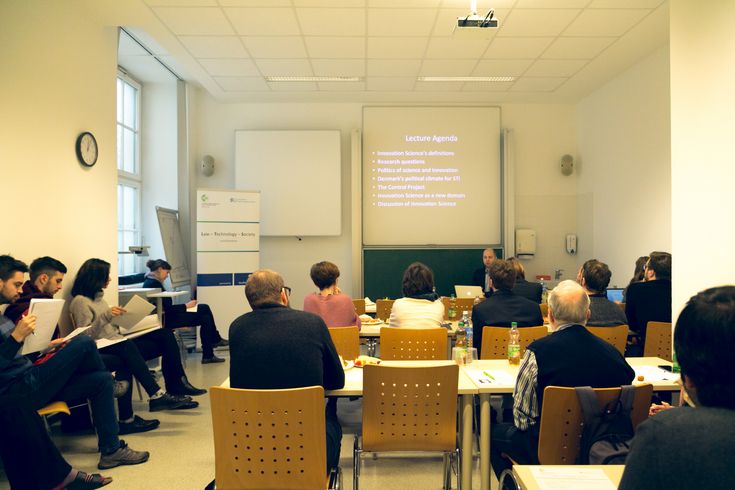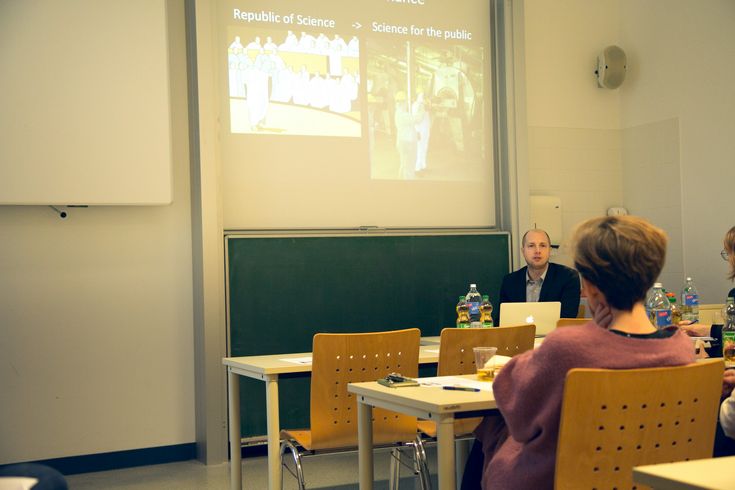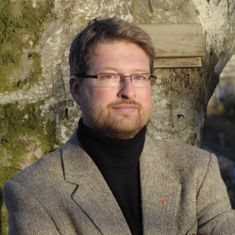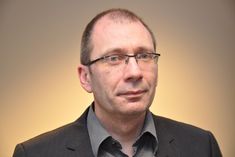Innovation Science: Between Models and Machines
10.01.2018
This year began with a new episode of ”Lunch Time Series on Law, Technology, and Society” (LTS). Assistant Prof. Joakim Juhl introduced the programme to the audience with his talk, ”Innovation Science: Between Models and Machines” on 10 January 2018. Joakim Juhl is an assistant professor at Aalborg University in Copenhagen, Denmark and a Research Associate with the Programme on Science, Technology, and Society (STS) at Harvard University. Juhl received his PhD in Science and Technology Studies at Aalborg University in Copenhagen. From 2013 to 2015, he held a joint postdoctoral position at the Harvard STS Programme and the Harvard School of Engineering and Applied Science. Since his research focuses on the normative foundations of technological innovation, the relationship between innovation and science and their impact on social expectations is a consistent theme in his studies.
Joakim Juhl started his talk with working definitions of ”Innovation Science”, which he developed through his research. Following this background, he presented his research questions, which deal with the connection between science and innovation. Finally, he introduced ”The Control Project”, a case study, where Juhl analysed scientific collaboration with industry.
So what is Innovation Science? According to Juhl, Innovation Science is ”publicly funded collaborations between academic scientists and industry that produce knowledge for commercial application”. Hence, Innovation Science can be seen as a service for the industry to boost both private stakeholders and the economy. Compared with the traditional form of science (Mode 1), where scientists worked for the sake of moving the boundaries of knowledge, Innovation Science focuses on solving problems for economic ends. Before WWII, it was generally accepted that science should be driven by curiosity and scientists should determine their own performance criteria, free from the influence of private stakeholders or corporations. Since the 1980s and 1990s, however, that idea has changed significantly. Science is now seen as an incubator for innovation, which is widely believed to depend on investment. Additionally, EU politics – for example – propose aiming for a 3% GDP investment in science, which should originate from both the public (1%) and private (2%) sectors.
Juhl inspired the audience to think critically about those fundamental modifications. To this end, he introduced some of his broader research questions, such as: What does the collaboration between academia and industry mean for the production of knowledge and its values? What does it mean to have scientists paid by the industry to actually cater to their interests? What makes such collaborations successful and how can we better understand their potential? Why should one collaboration be funded and not the other?
Juhl then introduced “The Control Project”. This is a three-year, collaborative project among theoretical physicists, a private company, and a production facility specialising in transforming meat industry waste products into biodiesel. They wanted to optimise their production while decreasing expenses and improving production yields. Juhl spent two years analysing their collaboration within the frame of the broader research questions mentioned above. The starting problem for this collaboration was the fact that more than half of the expenses for running the facility were used on energy consumption, which led to decreased production yields. Therefore, the private stakeholders wanted to understand the working systems within the machines. First, people working in the industry interviewed machine operators to collect data; the data were supposed to give insight into both the individual machine processes and the whole factory. On that basis, the physicists created representative physics models to predict the machines’ working system to optimise their processes. They implemented new feasible control systems into the machinery through both Representative and Control Modelling. Once they developed the analytic model, they converted it into a numerical model, where data can be inserted to calculate machinery outputs and run simulations. They conditioned the model for ideal processes instead of available production data in their attempt to connect theory with data. They chose theoretical deduction over a data-driven induction. In the end, the physicists spent too much time creating and refining the model in the time allotted; this resulted in the physicists never validating their empirical data models. Although the final physics models had no applicability on production, Juhl drew some basic lines from the collaboration for the field of Innovation Science. On the one hand, there are physicists working with industrial objects and applying universal knowledge to commercial artefacts. Their aim is not to satisfy solely the industry, but rather to withstand trial by their peers and therefore level the playing ground between academia standards and industrial application requirements.
On the other hand, some industries try to apply scientific standards and involve physicists to generate production data that is more scientifically adequate. Innovation Science therefore has a place in both contexts; it can change how physicists appropriate industry and also how industry tries to appropriate science.
The talk ended with a lively discussion about engineers serving as mediators between scientists and industry representatives, and about politics establishing the basic norms for collaboration among those three groups. Furthermore, working conditions for scientists and the interplay between their commercial obligations and scientific demands for their own work was of great interest. Needless to say, Juhl made sure to leave no question unanswered and continued discussing with the interested audience.
Verena Reiter, January 2018
You find the report here.
You find the paper by Mr Juhl here: Juhl, Innovation Science: between models and machines, Engineering Studies 8, 2016.
Law and technological change in past, present and future
Law and technological change in past, present and future
Unfortunately, the lecture by Prof. Sunde had to be cancelled due to illness. The session will take place in spring:
You can find information about Prof. Sunde's lecture "The Robot Judge: Law, Technology and Historical Patterns of Change", which will take place on 15 June 2018, here.
Regulatory challenges of robotics for Law, Innovation, and Technology
Regulatory challenges of robotics for Law, Innovation, and Technology
Unfortunately, the lecture by Prof. Leenes had to be cancelled due to illness. Robots are slowly, but certainly, entering people’s professional and private lives. They require the attention of regulators due to the challenges they present to existing legal frameworks and the new legal and ethical questions they raise. This lecture discusses four major regulatory dilemmas in the field of robotics: how to keep up with technological advances; how to strike a balance between stimulating innovation and the protection of fundamental rights and values; whether to affirm prevalent social norms or nudge social norms in a different direction; and, how to balance effectiveness versus legitimacy in techno-regulation. The four dilemmas are each treated in the context of a particular modality of regulation: law, market, social norms, and technology as a regulatory tool; and for each, we focus on particular topics – such as liability, privacy, and autonomy – that often feature as the major issues requiring regulatory attention. The lecture then highlights the role and potential of the European framework of rights and values, responsible research and innovation, smart regulation and soft law as means of dealing with the dilemmas. Ronald Leenes is full professor in regulation by technology at the Tilburg Institute for Law, Technology, and Society (TILT), Tilburg University, the Netherlands and director of the same institute. His primary research interests are techno-regulation, conceptual issues with respect to privacy, data protection in practice, data analytics, robotics and human enhancement. Currently his work focuses on accountability and transparency in Big Data and the Cloud and on regulatory failure in technology regulation. He was responsible for TILT's research in several EU projects, such as PRIME, PRIMELIFE, ENDORSE, Robolaw and A4Cloud and has contributed extensively to NoE FIDIS. He was PI.lab Scientific Director in 2011-2012.
The lecture will be followed by an open discussion. In Anglo-American tradition, catering will be provided during the lecture. The event is open for everyone and participation is free of charge. Please register until November 10th via law@boku.ac.at.
Further information about Mr. Leenes and his lecture is available here.
The lecture will take place in the Guttenberghaus SR 02, Feistmantelstraße 4, 1180 Vienna.
The LunchTimeSeries on Law, Technology & Society (LTS) is organized by Professor Iris Eisenberger, in collaboration with Professor Konrad Lachmayer. You can find the complete programm of the semester here.





